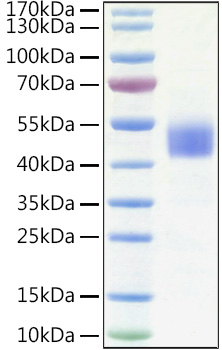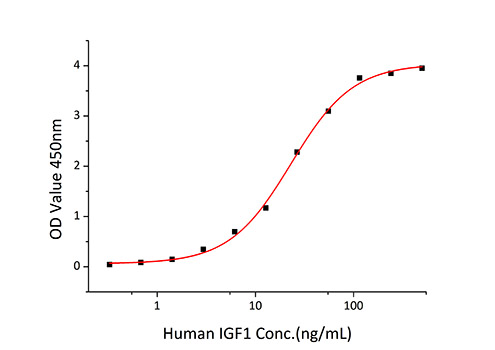Description
Recombinant Human IGFBP-3 Protein
The Recombinant Human IGFBP-3 Protein is a biologically active recombinant protein that plays a significant role in various cellular processes and signaling pathways in human biology. This protein is widely employed in immunological research, cell biology studies, protein-protein interaction analyses, and therapeutic development, providing researchers with a reliable tool for investigating IGFBP-3 function and its implications in health and disease.
This product (SKU: RPCB1541) is produced using advanced expression systems and features a C-His tag for convenient detection and purification. The protein exhibits a calculated molecular weight of 29.58 kDa with an observed molecular weight of 40-50 kDa under denaturing conditions, achieving ≥ 95 % as determined by SDS-PAGE.. Functional bioactivity has been validated through rigorous quality control assays, confirming its suitability for demanding research applications.
Key Features
| High Purity by Affinity Chromatography | |
| Mammalian & Bacterial Expression Systems | |
| High lot-to-lot consistency via strict QC |
| Product Name: | Recombinant Human IGFBP-3 Protein |
| SKU: | RPCB1541 |
| Size: | 10 μg , 20 μg , 50 μg , 100 μg |
| Reactivity: | Human |
| Synonyms: | IGFBP3, BP-53, IBP3 |
| Tag: | C-His |
| Calculated MW: | 29.58 kDa |
| Observed MW: | 40-50 kDa |
| Gene ID: | 3486 |
| Protein Description: | High quality, high purity and low endotoxin recombinant Recombinant Human IGFBP-3 Protein (RPCB1541), tested reactivity in HEK293 cells and has been validated in SDS-PAGE.100% guaranteed. |
| Endotoxin: | < 1 EU/μg of the protein by LAL method. |
| Purity: | ≥ 95 % as determined by SDS-PAGE. |
| Formulation: | Lyophilized from a 0.22 μm filtered solution of PBS, pH 7.4. |
| Bio-Activity: | Measured by its binding ability in a functional ELISA. Immobilized Human IGFBP3 Protein at 1 μg/mL (100 μL/well) can bind IGF1 with a linear range of 0.158-23.05ng/mL. |
| Reconstitution: | Centrifuge the vial before opening. Reconstitute to a concentration of 0.1-0.5 mg/mL in sterile distilled water. Avoid vortex or vigorously pipetting the protein. For long term storage, it is recommended to add a carrier protein or stablizer (e.g. 0.1% BSA, 5% HSA, 10% FBS or 5% Trehalose), and aliquot the reconstituted protein solution to minimize free-thaw cycles. |
| Storage: | Store at -20℃.Store the lyophilized protein at -20℃ to -80 ℃ up to 1 year from the date of receipt. After reconstitution, the protein solution is stable at -20℃ for 3 months, at 2-8℃ for up to 1 week. |
The Insulin-like Growth Factor (IGF) signaling system plays a central role in cellular growth, differentiation, and proliferation. IGFBP3 is the most abundant IGF binding protein in human serum and is a growth inhibitory, apoptosis-inducing molecule, capable of acting via IGF-dependent and IGF-independent mechanisms. It appears to function both by cell cycle blockade and the induction of apoptosis. IGFBP3 can be transported to the nucleus by an importin beta mediated mechanism, where it has been shown to interact with the retinoid X receptor alpha and possibly other nuclear elements. IGFBP3 antiproliferative signaling appears to require an active transforming growth factor-beta (TGF-beta) signaling pathway, and IGFBP3 stimulates phosphorylation of the TGF-beta signaling intermediates Smad2 and Smad3. IGFBP3 has IGF-independent roles in inhibiting cell proliferation in cancer cell lines. Nuclear transcription factor, retinoid X receptor (RXR)-alpha, and IGFBP3 functionally interact to reduce prostate tumor growth and prostate-specific antigen in vivo. Several clinical studies have proposed that individuals with IGFBP3 levels in the upper range of normal may have a decreased risk for certain common cancers. This includes evidence of a protective effect against breast cancer, prostate cancer, colorectal cancer, and lung cancer. Moreover, IGFBP3 inhibits insulin-stimulated glucose uptake into adipocytes independent of IGF.








